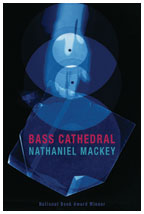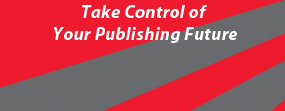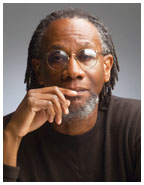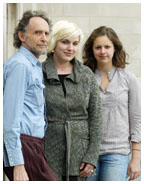April 23, 2008: Books and Arts
A jazz novel
Nathaniel Mackey ’69 pens avant-garde fiction and poetry
For a complete list of books received, click here.
Nathaniel Mackey ’69’s latest, “Bass Cathedral,” is the fourth volume in his ongoing novel. (courtesy New Directions) |
A
jazz novel
Nathaniel Mackey ’69 pens avant-garde fiction and poetry
By Jane Carr ’00
When Nathaniel Mackey ’69 began listening to jazz in the early 1960s, he found his way to albums by Miles Davis and Duke Ellington that his older brothers brought home. Captivated, he continued listening to jazz greats like Ornette Coleman and John Coltrane, drawn in over and over by what he recalls as the “mysterious and spiritual” nature of jazz music. He remembers writing a short story as a teenager while listening to Ahmad Jamal’s rendition of Gershwin’s “But Not For Me.” Jazz has continued to galvanize his work as a novelist and poet.
 His new
book, Bass Cathedral (New Directions), is the fourth part of a serial
fiction set in Los Angeles in the early 1980s, called From a Broken Bottle
Traces of Perfume Still Emanate. Like preceding volumes, Bass Cathedral
consists of letters from a musician named N. to his correspondent, the
Angel of Dust. In this latest installment, N. and his jazz ensemble, Molimo
m’Atet, release their album, Orphic Bend. As the epistolary narrative
unfolds, N. engages the Angel as an artist, collaborator, and confessor.
His new
book, Bass Cathedral (New Directions), is the fourth part of a serial
fiction set in Los Angeles in the early 1980s, called From a Broken Bottle
Traces of Perfume Still Emanate. Like preceding volumes, Bass Cathedral
consists of letters from a musician named N. to his correspondent, the
Angel of Dust. In this latest installment, N. and his jazz ensemble, Molimo
m’Atet, release their album, Orphic Bend. As the epistolary narrative
unfolds, N. engages the Angel as an artist, collaborator, and confessor.
The plot reveals only a fraction of Mackey’s novel, however; his thick and referential imagery highlights his acuity with literary and jazz history. Mackey forsakes realism and linear narrative, which he realizes poses significant difficulties for readers — but he says, “I hope my work proposes analogous challenges and rewards.” A recent review in The New York Times lauds Bass Cathedral as “a virtuoso performance ... not simply writing about jazz, but writing as jazz.”
A professor of literature at the University of California at Santa Cruz, Mackey also hosts a radio show, Tanganyika Strut, on public radio, which highlights African sounds from all over the world. Mackey got his start in radio at Princeton as the host of his own jazz show on WPRB. An English major, he thrived in close proximity to New York City, frequenting its many jazz clubs. A chance meeting with poet Amiri Baraka in a Greenwich Village bookstore led to Mackey’s organizing a reading for Baraka at Princeton. Mackey went on to write his senior thesis on Baraka, whose poetry has been a formative influence on his own work. Baraka’s use of more experimental forms, and especially his engagement with musical influences, was especially critical for Mackey’s understanding of the relationship among writing, reading, and music.
As a poet, Mackey has immersed himself in experimental poetry and poetics, the subject of his dissertation at Stanford and the creative method for many of his acclaimed collections. In 2006, Splay Anthem, his most recent collection and the latest installment of two ongoing serial poems, received the National Book Award. In his poetry as well as in his fiction, the rhythms and history of jazz are consistent themes, as are myths and the African diaspora.
Throughout a career distinguished by its commitment to music and experimentation,
Mackey works slowly, deliberately, and, in his words, “by accretion.”
“Attention to method, manner, the how of things,” he says,
“go hand in hand with a concern for the what of things, the way
of things.” ![]()
Jane Carr ’00 is a writer and graduate student in New York City.
For a complete list of books received, click here.
 Explosion:
The Hungarian Revolution of 1956 — John P.C. Matthews ’51
(Hippocrene Books). In this account of the Hungarian uprising and Soviet
crackdown, the author, a former Radio Free Europe journalist in Munich,
re-creates the events using notes and dispatches from his coverage at
the time, interviews with survivors, and official records. Matthews joined
Radio Free Europe in 1951 and eventually became head of European operations
for Free Europe Press.
Explosion:
The Hungarian Revolution of 1956 — John P.C. Matthews ’51
(Hippocrene Books). In this account of the Hungarian uprising and Soviet
crackdown, the author, a former Radio Free Europe journalist in Munich,
re-creates the events using notes and dispatches from his coverage at
the time, interviews with survivors, and official records. Matthews joined
Radio Free Europe in 1951 and eventually became head of European operations
for Free Europe Press.
 The View from
the Masthead: Maritime Imagination and Antebellum American Sea Narratives
— Hester Blum ’95 (University of North Carolina Press).
Through examining first-person narratives of 19th-century working sailors,
from little-known sea tales to more famous works by Herman Melville and
James Fenimore Cooper, the author argues that these laborers contributed
to literary culture. Blum is an assistant professor of English at Pennsylvania
State University.
The View from
the Masthead: Maritime Imagination and Antebellum American Sea Narratives
— Hester Blum ’95 (University of North Carolina Press).
Through examining first-person narratives of 19th-century working sailors,
from little-known sea tales to more famous works by Herman Melville and
James Fenimore Cooper, the author argues that these laborers contributed
to literary culture. Blum is an assistant professor of English at Pennsylvania
State University.
 My Mistress’s
Sparrow Is Dead: Great Love Stories, from Chekhov to Munro —
edited by Jeffrey Eugenides (HarperCollins). The 26 love stories in this
anthology, from Anton Chekhov’s “The Lady with the Little
Dog” to Alice Munro’s “The Bear Came Over the Mountain,”
are not happily-ever-after affairs. Instead, as Eugenides writes in the
introduction, “Love stories depend on disappointment, on unequal
births and feuding families, on matrimonial boredom and at least one cold
heart.” Eugenides, a professor of creative writing at Prince-ton,
is the author of the Pulitzer Prize-winning novel Middlesex.
My Mistress’s
Sparrow Is Dead: Great Love Stories, from Chekhov to Munro —
edited by Jeffrey Eugenides (HarperCollins). The 26 love stories in this
anthology, from Anton Chekhov’s “The Lady with the Little
Dog” to Alice Munro’s “The Bear Came Over the Mountain,”
are not happily-ever-after affairs. Instead, as Eugenides writes in the
introduction, “Love stories depend on disappointment, on unequal
births and feuding families, on matrimonial boredom and at least one cold
heart.” Eugenides, a professor of creative writing at Prince-ton,
is the author of the Pulitzer Prize-winning novel Middlesex. ![]()
By K.F.G.
From left, Stephen Wangh, Kristin Dombek, and Katie Seaver ’10. (Frank Wojciechowski) |
Making
art out of a cultural divide
Atelier gathers testimony from conservative Christians and nonbelievers
During the 2004 presidential election, playwright Stephen Wangh was struck by the way some media commentators denigrated George Bush supporters, while members of the Christian right belittled liberal humanists. The rhetoric from both the right wing and secular liberals, he says, “seemed equally righteous.” Wangh thinks, in retrospect, that one of his own works, The Laramie Project, about homophobia in Wyoming, had “demonized the religious right.”
The cultural divide playing itself out in politics and American culture, he thought, might make fodder for a play. He called Kristin Dombek, at the time a graduate student in English at New York University where Wangh was teaching acting, and suggested exploring that clash in a documentary theater piece. They began interviewing people on both sides of the divide — evangelical Christians and nonbelievers — about their religious and political views.
This semester Wangh, “an agnostic or an atheist,” and Dombek, a lecturer in the Princeton Writing Program and a former evangelical Christian who says she is “working on being an atheist,” are continuing their project as they lead “Atelier 499/Theater 499: The Testimony Project: Documentary Theater.” The project will culminate with performances May 9–10 in Whitman College’s theater.
The instructors and the 14 students in the theater workshop — atheists, agnostics, evangelical Christians, Catholics, a Buddhist, and a secular Jew — aim to “open a space in which people of many opinions can see the likenesses and the differences in their ways of viewing the world,” says Wangh, a visiting faculty member at Naropa University in Boulder, Colo., and a guest artist in Princeton’s Atelier. That dialogue starts in the class setting, as students explore each other’s religious and political views. The students also interview other people on and off campus.
After Atelier students Erica Greil ’10, who is Catholic and took last year off to ponder becoming a nun, and Katie Seaver ’10, an atheist, interviewed each other, Greil began to see how similar are their ideas about grief, family, and goodness. She was “amazed,” she says, having never had a deep conversation about such issues with an atheist. Another student, Heather May ’10, a religion major from England who is agnostic, admits that it has been difficult talking to evangelicals. “I find the language very alienating,” she says, referring to statements such as “I live my life in the arms of God.”
In choosing people to interview, the instructors and students seek those with interesting stories — a gay male friend who is considering becoming a priest, a Jewish student who lost his faith at Princeton and is now atheist, activists and counselors in an anti-abortion pregnancy crisis center. In March several students and Dombek traveled to an evangelical megachurch in Grand Rapids, Mich., and another group of students headed to New York to interview reproductive-rights activists.
During a class session in Whitman College’s theater in late February, the students read aloud snippets of interviews they had done so far, to see what might work on stage. The students also have been researching issues such as apocalyptic belief and rhetoric and controversy over “family values” to help them shape the final work.
As of mid-March, the students and instructors didn’t know where the production was headed — what the central theme would be, which interviews would end up in the play — or how it would all come together. The messiness of the process, says Wangh, is “terribly uncomfortable.” At times, he adds, the students ask, “What is this about?” And he replies, “We don’t know yet.”
Still, Greil had figured this much out: “We say we are exploring
these divides between these two sides, but what a lot of people don’t
realize is that they [the two sides] are really a lot closer together
than people think.” ![]()
By K.F.G.


